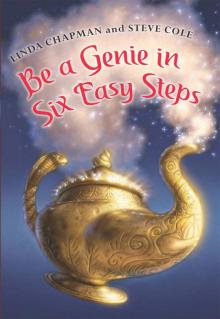- Home
- Linda Chapman
The Secret Garden
The Secret Garden Read online
Contents
Cover
Title Page
1. Noises in the Night
2. A Long Journey
3. Misselthwaite Manor
4. The House at Night
5. Exploring Misselthwaite
6. Making Friends
7. Colin
8. Mr. Craven
9. The Secret Garden
10. Cousins
11. Dreams and Memories
12. Dickon
13. The Hidden Room
14. The Robin’s Secret
15. Taking Risks
16. New Friends
17. Caught!
18. Prisoner!
19. Unlocking the Past
20. A Way Out
21. The Fire
22. Believe in Magic
23. Four Months Later . . .
Photo Section
Copyright
About the Publisher
1
Noises in the Night
Mary Lennox couldn’t sleep. A large ceiling fan spun slowly around and around, but it was too warm to get comfortable. Outside, in the dark Indian night, the sounds of insects chirping were drowned out by people shouting. The servants are being very noisy tonight, Mary thought. Why doesn’t Daddy tell them to be quiet? Sitting up in bed, she pushed her chin-length hair back behind her ears and picked up her rag doll.
“Jemima, can you sleep?” she whispered. Jemima stared back at her.
Mary liked to pretend that Jemima could understand everything she said because talking to Jemima and telling her stories helped Mary feel less lonely and bored. She didn’t have any brothers or sisters, and the servants—apart from her ayah, her Indian nanny—kept their distance. Mary wasn’t allowed to play outside much because the sun was very strong. Her father was too busy with his work to play games with her as much as she’d like and her mother . . . Mary chewed her lower lip. She knew her mother didn’t like her. At times, Mary even suspected that she hated her.
Well, I hate her too, Mary thought, scowling.
There was a scream from somewhere in the villa and then the sound of a crash and a door slamming. A wisp of fear curled in Mary’s tummy as she glanced at her bedroom door. What was going on?
She’d heard her father talking to his friends about how there was a lot of fighting in India at the moment. Mary didn’t really understand, but it sounded like the Indian people didn’t want the English to be in India anymore and wanted them to leave. Daddy and his friends had talked about fighting in the streets. But surely those streets were a long way away, in distant cities. The Indian servants who worked for the Lennox family did whatever they were told, so Mary couldn’t imagine them fighting. No, she was safe here. Nothing bad would happen to her.
Trying not to listen to the muffled bangs and crashes and shouts from outside her room, she stroked Jemima’s woolen hair. “Are you scared, Jemima?” she whispered. “Well, don’t be. It’s just grown-ups being grown-ups. Shall I tell you a story to make you feel better?”
Lighting a lantern, she got out of bed and took Jemima to a den she had made out of cushions and throws in the middle of her room. She began to recite one of her favorite stories, using shadow puppets to act it out as she spoke. It was a story her ayah had told her about a boy named Rama and a girl named Sita who loved each other, but then, one day, a demon kidnapped Sita and took her away. Ayah’s stories were always filled with gods and demons, magic and excitement.
By the time Mary was nearing the end, the noises outside had quieted down, and her eyelids were starting to feel heavy. “Rama was just about to catch up with Sita and the demon, but then the demon threw down fire and imprisoned him in flames,” she said, yawning. “Luckily, the fire god, Agni, was watching and he parted the flames and carried Rama up into the clouds. After that, the two of them set off, looking—ever looking—for Rama’s love,” she finished.
Blowing out the lantern, Mary sank back on the cushions with Jemima in her arms. Her eyelashes fluttered, and a few seconds later she was asleep.
A damp green lawn . . . flower beds filled with pink, lilac, and blue flowers . . . trees with branches bursting with blossom . . . Mary ran down a path past statues. . . . A grown-up was holding her hand. She was laughing, trying not to fall over, and she felt happy, wonderfully and completely happy. . . .
Slowly, Mary began to wake up. For a moment, she tried to hold on to the familiar dream, but it faded just like it always did. The dream garden looked so different from any garden she had ever known, but it seemed so real to her when she was there and she always felt truly happy in it. With a sigh, she rubbed her eyes. The first thing she noticed was that the shutters were still open and it was very bright outside. Sunlight was flooding in through the window. Mary’s tummy rumbled. Where was her ayah? Why hadn’t she brought her breakfast?
Feeling hungry and cranky, she sat up in her den. “Ayah!” she called loudly. To her surprise, the door didn’t open to reveal her ayah’s kindly face. Feeling even crankier, Mary raised her voice. “Ayah! I’m calling you! It’s late and I’m not even dressed!” Her voice reached shouting pitch. “AYAH!”
Mary waited. Still no one came. What was going on? The house was very quiet. That was peculiar, she realized. Usually, she could hear the servants bustling around. Unease flickered through her as she remembered the strange noises in the night.
“Should . . . should we go and look around and see if we can find anyone, Jemima?” She tried to sound brave, but her voice trembled slightly. “Yes, I think that’s a very good idea,” she went on. “Don’t worry. I’ll look after you. We’ll go and find Daddy, and he shall get Ayah for us.”
Opening the door of her bedroom, she paused. The corridor outside her room was in chaos. Pictures had been pulled from the walls and were now lying on the floor without their gold frames. Heart beating fast, Mary started to hurry through the villa. Every room was the same—curtains had been torn down, ornaments lay smashed on the floor, much of the furniture had disappeared, and in the kitchen, the cupboards were open and the shelves bare. Everything of any value had vanished, and worst of all, there was no one there at all.
“Father? Daddy? Ayah?” Mary’s voice rose anxiously. She pushed the doors to the veranda open. The sun shone down brightly, but the garden was as deserted as the house. Mary clutched Jemima.
“Where have they all gone?” she whispered.
2
A Long Journey
Mary sat on a wooden bench on the deck of an enormous ship as it chugged across the vast ocean, leaving India and heading toward England. Her back was straight, and she stared silently up at the sky, holding Jemima in her arms. Nearby, a group of children was playing noisily on the deck, but Mary didn’t join in with them. It had been several weeks since she had woken up and found her home had been ransacked, but it felt like a lifetime ago.
No one had come to the house for two days, until two English officers turned up. They had been astonished to find her there—dirty, thirsty, hungry—and had taken her to the hospital. She had asked them where her father and mother were, but they had just told her to be a good girl and not to worry. At the hospital, a nurse gave her something to eat and drink, and had helped Mary bathe and change into clean clothes. Then Mary was seen by a doctor. Neither the nurse nor the doctor would answer her questions about her parents either.
As she waited in a small room, wondering when Daddy was going to come and take her home and what he would say when he found out that all the servants had vanished, she heard the two officers talking in a room next door.
“This is a frightful mess,” said one gravely. “Poor child. If only we had evacuated the family before the trouble broke out. The cholera epidemic couldn’t have come at a worse
time for them.”
Mary pricked her ears. She knew that cholera was a disease that killed lots of people, but what did it have to do with her family?
“The doctor tells me her mother was struck down with cholera very suddenly. Her father rushed her here in the night, but it was too late,” the first officer continued.
Mary froze, foreboding running down her spine. Too late for what?
“The mother died that night and then the father died the next morning.”
Mary’s heart started to pound so fast she thought it was going to burst out of her chest. Mother and Daddy . . . both dead? She drew in a sharp breath. No, they couldn’t be dead. They couldn’t be! But even as the thought formed she knew, with a horrible, crashing certainty, that it must be true. The officers wouldn’t make a mistake about something like that. A sob ripped up through her, half whimper, half choking cry.
There was the sound of feet, and one of the officers looked in through the door. “Oh, Lord. She’s here.” He cleared his throat awkwardly, obviously having no idea how to comfort a ten-year-old girl.
His companion joined him. “What in heaven’s name are we going to do with her? She can’t stay here,” he said.
Mary looked up through her tears to see the first officer consulting his notes.
“She has a widowed uncle in England,” he said. “We’ll send her back on the boat with the other children.”
From then on, Mary was passed around like an unwanted parcel. On leaving the hospital, she was sent to stay with a clergyman named Mr. Crawford, who had a wife and five children of his own. She heard the adults around her saying it would be better for her to be with other children, but she didn’t understand why. She didn’t want to play with the Crawford children. They were younger than her, and they wanted to know all about her parents and how they had died. She felt miserable and wouldn’t answer their questions. Finally, she lost her temper, ripping up a drawing that the youngest had done for her and screaming at them all to leave her alone. After that, they stayed away from her, watching her as if she was a strange, wild animal. Mary didn’t care. She didn’t feel like she would care about anything ever again.
She had heard the clergyman and his stout, well-meaning wife talking about her in whispers: “Poor child . . . word has been sent to England . . . He’s her uncle by marriage, you know. . . . He was married to her mother’s twin sister, who died years ago. . . . Such a tragedy, poor man . . . but he’s her only living relative. . . . He’ll have to take her, whether he likes it or not. . . .”
Finally, a telegram had arrived. “The ship that will take you to England leaves tomorrow,” Mrs. Crawford informed Mary. “Your uncle—Mr. Craven—who was married to your aunt, Grace, has agreed to take you in. He lives in Yorkshire at a place called Misselthwaite Manor. You’re a lucky girl, Mary. Your uncle is a rich man.”
Mary swallowed. How could Mrs. Crawford possibly say she was lucky? Her parents were dead, and she was going to live with some old uncle in a horrible house in a strange country! Tears pricked her eyes, but she wouldn’t cry in front of the Crawfords—she wouldn’t!
Pressing her lips tightly together, she nodded and then walked up the stairs. Reaching her bedroom, she shut the door behind her and then threw herself down on the bed, sobbing into the pillow to muffle her bitter tears.
The ship that carried Mary from Bombay to England was crowded and noisy. There were many families on board, all returning to England because of the unrest in India. Mary had to eat with the other children and do what she was told. She hated it—the food was horrible and the other children were rough and loud. On the first day, she had pushed her plate of food away. “This is disgusting!” she said.
A scruffy boy sitting next to her grabbed her plate and emptied the food onto his own plate.
Mary stared at him, outraged. “I didn’t say you could do that!”
“You didn’t say I couldn’t,” the boy replied. “If you aren’t going to eat it, I am.”
“You don’t understand,” Mary exclaimed. “I need better food than this. My parents are dead.”
He shrugged. “We’ve all lost, girl.”
Mary watched as he gobbled up her food. She didn’t like him much, but he was the only person who had spoken to her so far. “Would . . . would you like to hear a story?” she asked tentatively.
He gave her a scornful look. “No, I’m not a child.” He got up and moved away to sit by someone else, leaving Mary on her own. Since then, she had barely spoken a word to anyone.
Standing up, Mary now walked to the side of the ship. A railing ran around the deck, and the deep blue ocean swelled below. She lifted up Jemima. Maybe she could tell her one of Ayah’s tales and escape into it, forgetting everything else. Telling stories had always been her way of coping when Mother didn’t want to see her or when Daddy was too busy to play.
“I’ll tell you a story, Jemima,” she said. “Just like I used to do at home. There once was a lord of the seas. His name was Varuna and he . . . and he . . .”
The words seemed to dry up in her head. She tried again. “Varuna was very powerful. He . . .” She faltered. But it was no use. All Mary could think about was home.
“I don’t have a home, do I, Jemima?” she whispered. “I don’t belong anywhere or to anyone now.”
Mary felt a sudden stab of pain as she looked into Jemima’s blank face. Jemima was just a doll, not a friend. Only children played with dolls, and children had to eat what they were given and keep quiet. Children were passed from place to place; children had to do what grown-ups wanted. She suddenly made up her mind.
“I’m not a child,” she said fiercely. “Not anymore.”
She let Jemima go. As the doll hit the water far below, shock filled Mary. What had she just done? Jemima floated on the surface for a moment. She stared up at Mary one last time, and then the waves dragged her under.
A lump swelled painfully in Mary’s throat, but she swallowed it back. No more tears, she told herself. She lifted her chin, her eyes defiant. She wasn’t going to cry again—not now, not ever.
Crossing her arms, she turned away from the railings, a lock snapping shut on her broken heart.
3
Misselthwaite Manor
When the ship arrived in England, Mary was met by a stern-looking woman with gray hair. She wore a buttoned-up blue woolen overcoat, with just the hint of a scarf at the neck, and had a leather handbag over her arm. She looked Mary up and down, and from the way her forehead crinkled, Mary had a feeling she didn’t approve of what she saw. “My name is Mrs. Medlock,” she announced. “I am Mr. Craven’s housekeeper, and you are to come with me.”
Mary was reminded of a word her father had once used to describe the elderly aunt of a colleague. Formidable, he had called her. Yes, formidable is just what Mrs. Medlock is, thought Mary. But she reminded herself that Mrs. Medlock was just the housekeeper—a servant—and so had to do what the family told her to do.
Remembering her decision not to be a child anymore, Mary met Mrs. Medlock’s gaze. “Very well,” she said coldly.
Head held high, Mary followed Mrs. Medlock to the train that was to take them to Yorkshire. As the whistle went and the train started to puff along the rails, clouds of steam shooting out from its funnel, Mary became aware that Mrs. Medlock was studying her.
“Well, you’re a plain little piece of goods, aren’t you?” Mrs. Medlock said in her Yorkshire accent.
Mary puzzled over the words, trying to work out what they meant. I think it’s her way of saying I’m not very pretty, she decided. Mary didn’t mind the comment because she didn’t consider herself particularly pretty either. She didn’t have the long golden hair of a princess in a storybook or the jet-black hair and enchanting brown eyes of the Indian girls in her ayah’s tales. She was small and skinny with hair the color of a chestnut. Her skin was pale, her inquisitive hazel eyes almost too large for her face. Her words are true, Mary thought, but what a strange thing for a servant to s
ay.
She turned and stared out of the window.
Opposite her, Mrs. Medlock settled herself more firmly in her seat. “Now I don’t know what you’ve been told, girl,” she began with a warning note in her voice, “but don’t be expecting luxury at Misselthwaite. It’s not the house it was.”
Mrs. Medlock’s eyes grew distant, and for a moment Mary had a feeling she was reliving the past.
“When the young mistress was alive, there was a full household staff, a stable of horses, grand balls, but that’s all changed now.” She tutted indignantly. “Those army savages! They turned the house into a hospital during the war. Brought the wounded, the dead, and the dying. They set up camp in the garden and kept their sick in the ballroom. Quite took over the place, and now there’s no knowing what to do with the house. They left it a wreck!”
Mary didn’t say anything.
Mrs. Medlock clearly expected more of a response. “Well? Don’t you even care?”
“Does it matter whether I care or not?” said Mary bluntly.
Mrs. Medlock’s eyes narrowed. She gazed at her for a long moment. “Well, you are an odd duck, aren’t you?”
Mary’s initial dislike of the housekeeper intensified, and she turned to look out of the window again, not wanting to talk to her anymore. Mrs. Medlock sniffed and got out a book to read.
As the train headed north, Mary continued to gaze out. England was so gray! Rain slanted against the train window. Sodden fields stretched in all directions, cows and sheep hanging their heads in the downpour. It was so different from the bright sunshine of India. There the rain was as welcomed as a longed-for guest, making flowers burst into life and fresh green buds push their way up through the parched soil.
On and on the train went, until they pulled into a station and transferred to a car driven by an unsmiling, gruff man. As they drove away from the station, Mary fell asleep. When she woke up, she saw an endless expanse of gray on either side of the car. She had never seen anything like it. “Is that the sea?” she asked as she looked at the clouds swirling across the top.

 The Secret Garden
The Secret Garden A Forever Home for Tilly
A Forever Home for Tilly A Forever Home for Bella
A Forever Home for Bella A Forever Home for Pip
A Forever Home for Pip Be a Genie in Six Easy Steps
Be a Genie in Six Easy Steps The Last Phoenix
The Last Phoenix Hidden Charm
Hidden Charm The Floating Forest
The Floating Forest Skating School: Blue Skate Dreams
Skating School: Blue Skate Dreams Unicorn School: the Treasure Hunt
Unicorn School: the Treasure Hunt Bright Lights
Bright Lights Skating School: Amber Skate Star
Skating School: Amber Skate Star The Spider Gnomes
The Spider Gnomes Sky Horses: the Royal Foal
Sky Horses: the Royal Foal Not Quite a Mermaid
Not Quite a Mermaid Not Quite a Mermaid: Mermaid Fire
Not Quite a Mermaid: Mermaid Fire Skating School: Violet Skate Friends
Skating School: Violet Skate Friends Dreams
Dreams Dark Tricks
Dark Tricks The Fog Boggarts
The Fog Boggarts Secret Spell
Secret Spell Centre Stage: A Novel
Centre Stage: A Novel The Swamp Boggles
The Swamp Boggles Skating School: Sapphire Skate Fun
Skating School: Sapphire Skate Fun Unicorn School
Unicorn School Skating School: White Skate Wishes
Skating School: White Skate Wishes Star Friends – Mirror Magic
Star Friends – Mirror Magic Wish Trap
Wish Trap My Secret Unicorn
My Secret Unicorn The Goblin King
The Goblin King Sky Horses: the Whispering Tree
Sky Horses: the Whispering Tree Hopes
Hopes The Icicle Imps
The Icicle Imps Stardust
Stardust Skating School: Silver Skate Surprise
Skating School: Silver Skate Surprise Night Shade
Night Shade Dreams Come True
Dreams Come True Skating School: Scarlet Skate Magic
Skating School: Scarlet Skate Magic Skating School: Pink Skate Party
Skating School: Pink Skate Party Loving Spirit
Loving Spirit Cloud Magic
Cloud Magic